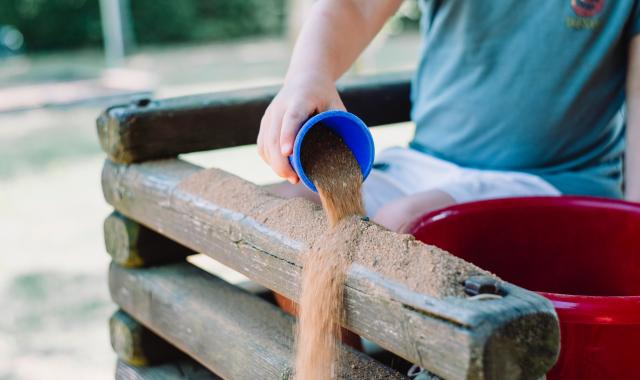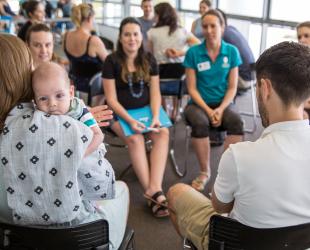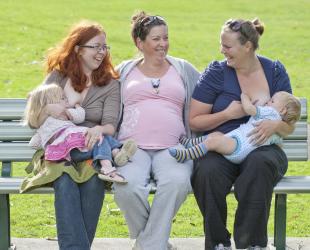Pam's story of breastfeeding her third child
Breastfeeding, although natural, is also a learned skill. Lots of first-time mums learn to breastfeed and overcome any hurdles when they’ve only got their baby to look after. For others they might learn to breastfeed while also looking after older kids. This was the case for Pam. In this episode she shares her story with Laura about her experience learning to breastfeed for the first time with her third child.

Podcast episode
Podcast information
Pam's story of breastfeeding her third child
Breastfeeding, although natural, is also a learned skill. Lots of first-time mums learn to breastfeed and overcome any hurdles when they’ve only got their baby to look after. For others they might learn to breastfeed while also looking after older kids. This was the case for Pam. In this episode she shares her story with Laura about her experience learning to breastfeed for the first time with her third child.
Information discussed in this episode:
- How do I know if my baby is getting enough breastmilk?
- Baby weight losses and weight gains
- Planning to breastfeed? Prepare with a breastfeeding class
- Preparing your toddler for the new baby
- Find your local support group
- Find out more about training with Australian Breastfeeding Association
Credits:
This episode is presented by Laura Wellard. Featuring Pam Halnon.
Audio editing by Jessica Leonard. Show notes by Belinda Chambers. Transcription by Madina Hajher. Produced by Belinda Chambers, Jessica Leonard and Eleanor Kippen.
[music, fades to background]
PAM: He fed well but then two hours later, or maybe sometimes an hour and a half later, wanted to feed again. It was probably the hardest thing for me to get my head around. But, luckily for me, his weights were good and so I was seeing that I was providing what he needed, and he was putting on weight even if I was having to provide it a lot.
LAURA: Welcome to Breastfeeding…with ABA, a podcast brought to you by volunteers from the Australian Breastfeeding Association. Breastfeeding…with ABA is a podcast about breastfeeding made by parents for parents.
[music fades out]
LAURA: We’re recording this podcast in different parts of Australia. We acknowledge the traditional custodians of the land on which we are recording you are listening. We pay our respects to elders, past, present and emerging and to any indigenous people listening. We also acknowledge the long history of oral storytelling on this country and of women supporting each other to learn to feed their babies. In each episode you will hear from different ABA volunteers around Australia.
My name is Laura and I’m a volunteer breastfeeding counsellor and a mum to three kids. I am speaking from Victoria, Wadawurrung country. Many mums start their breastfeeding journey when their first baby arrives. Although breastfeeding is natural it’s still a learnt skill. Lots of first-time mums learn to breastfeed and overcome any hurdles when they’ve only got their baby to look after but for others they might be learning to breastfeed while also looking after older kids. That was the case for Pam who learned to breastfeed for the first time with her third child. Here’s Pam to share her story. Alright Pam so tell me about the first time that you found out you were pregnant.
PAM: It would have been in the winter, a very cold winter, and I had two boys already. We had been told that we couldn’t have children and we had adopted two sons and so they were nearly four and almost two. I had still decided to continue on (the) fertility program with the Royal Women’s Hospital and even though I’d been on it for five years with no positive results, I did decide that I’d give it another year and see what happened. So, it was a very big surprise when after taking the medication I had to take, didn’t get my period and so I rang up the specialist who said ‘oh look, wait a week and go do a pregnancy test’, not expecting at all for anything out of that. And, lo and behold, it was a positive!
LAURA: Wow so you had two toddlers at home already, which I can imagine would have been busy times.
PAM: It was very busy yes.
LAURA: Very busy times, but there was something within you that just wasn’t quite ready to give up on that dream of being pregnant.
PAM: Yeah, and I’m not sure what… I think I’d given myself an age limit sort of like if I’m not pregnant by this age then that’s it. I don’t know if it was probably some feeling that I still wanted to get pregnant and have a baby if that was going to happen, and if it didn’t happen that was okay.
LAURA: Yeah.
PAM: It was okay too. I went into a different frame of mind there, than I had in those first five years trying to get pregnant, which every time you did get your period was the loss of a baby that you didn’t have. And I don’t think many people sort of realise the pressure and the emotional pressure that goes on every month with women who are having difficulties conceiving.
LAURA: Yeah absolutely. And although you’ve got these 2 beautiful boys that you’re caring for and they’re your sons, there was still a feeling of loss. Yeah.
PAM: There was still a feeling of loss, I think that feeling of loss disappeared a little bit after we adopted our first son and it probably reduced even more after our second son. We had our family but there was still that desire and I always said that I wanted three children so, it was always that little bit of desire still there to have that subsequent baby…
LAURA: And that family that you thought…
PAM: In my mind when I was young, I always thought I was going to have three girls actually.
LAURA: I love this, what we think is going to be our wonderful family (laughter)
PAM: And I ended up with five boys!
LAURA: I was just going to say what did your family end up looking like, Pam?
PAM: Five boys.
LAURA: Five beautiful boys. [laughter] Yeah, so amazing and so you adopted your first two and then the next three boys
PAM: Were all naturally conceived.
LAURA: Wow, that’s just so amazing. And I’m sure not an uncommon story, you know.
PAM: It probably is uncommon but, because it’s a story that when somebody hears it, they tell lots of people, so the actual feeling is ‘oh, that’s a common story’ when in actual fact it’s not that common.
LAURA: So, I’ve got three kids and pregnant with my first son and had him and that journey of learning to breastfeed and figuring it all out I had the space and time to do that with just the two of us. I didn’t have toddlers running around when I was learning this new skill however, for yourself, quite a different story?
PAM: Yes, yes it was. I had friends who’d breastfed, so I had that breastfeeding journey in the back. When I was first pregnant, I didn’t even really consider what I was going to do in the future. It was more the fact of ‘oh I’m pregnant’ which is probably the same as first time mums. They probably spend their time thinking about the pregnancy to start with, and I was a little bit nervous because it was such a shock that I was pregnant that probably until I got to about 24, 25 weeks, I really didn’t enjoy the pregnancy because I was scared that something was going to go wrong because it just wasn’t quite right. It wasn’t what had happened to me over the years but then probably from six months onwards I started to think, ‘oh this baby is probably going to happen, and … ‘
LAURA: This is real!
PAM: ‘This is real.’ And um, the tummy’s telling me it’s real!
LAURA: I’ve got signs!
PAM: And um, now I understand all the complaints about the sore backs and the sore boobs and having to go to the toilet all the time and all these things that I thought were just people whinging [laughter]. I experienced then that maybe they were right and also the thing of still running after a couple of toddlers was a big effort too. So, I am much more sympathetic to mums [laughter].
LAURA: Yeah, as a lived experience.
PAM: Yeah, since I have had that lived experience. I started to think about breastfeeding when I was invited to a ‘Prepare to Breastfeed’ session that the local ABA group were having. And so, I went along, it was actually run by a lady whose husband worked with my husband so she had invited me along and so I went along, and it was all very interesting, and I learnt a lot about it. But I sort of come out thinking, ‘oh, well, maybe I’ll breastfeed, I’ll give breastfeeding a go, but I’ve got bottles, I’ve got formula if it works, it works and if it doesn’t well then that’s not a problem.’
LAURA: Yeah, took the pressure off, because you did keep two humans alive already, so you knew…
PAM: Yup, yup for sure. I sort of thought, oh, well, if I’m doing the whole birth experience then it would be nice to do the breastfeeding experience too. But I didn’t put any expectations on myself, I have an older sister too and she never breastfed, and she gave the impression that ‘well, you won’t be able to because no one in our family breastfeeds’. So I sort of had that in the back of my mind but also I’m a little bit stubborn so her saying that was actually also a positive towards breastfeeding because I thought ‘ha, just because you didn’t do it doesn’t mean that I can’t’. There was a little bit of competition between…sibling rivalry [laughter]. I look back now and I think hmm… I didn’t think about it quite as strongly then, but I now look back and think, ‘yeah that was one of the motivators, too for me to breastfeed’.
[music fades in]
ADVERTISEMENT
JESS: Whether you’re expecting your first baby, or you’ve already got children, learning about breastfeeding can help you along the way. ABA offers Breastfeeding Education Classes to expectant parents. Our volunteers host face to face classes around the country as well as online interactive webinar versions if you can’t get out and about. To find out more, visit beastfeeding.asn.au and look under the services section or enter ‘classes’ in the search bar.
[music fades out]
LAURA: And I can imagine there’s many pregnant women out there that maybe haven’t been surrounded around breastfeeding, or you’re not seeing it out in public as much and sort of think oh, I know my thoughts about it when I was pregnant first time around was ‘it’s a natural thing how hard could it be’? But I sort of didn’t put too much thought into it either until I had him, but I had the time and space that one child allowed. I know with my third, which was essentially your experience, I had two parrots on my shoulder watching me and wanting my attention.
PAM: Yes.
LAURA: And that would have been the same for you, I imagine?
PAM: Yes, it definitely was. I probably was lucky that with the support of the ABA counsellor who visited me in hospital because she was an acquaintance, and then was very active with me in the next couple of weeks, she visited every week. And she’d ring me every couple of days to see how I was going, that any little hiccup I hit I got rid of very quickly because I had that support and I’m so glad that I got connected into the local group really, really early. Even like before I had the baby, I knew because I’d done the session on preparing to breastfeed with the local group. I knew people, I had got to know people and I would go shopping and somebody from the local group would walk past and say, ‘Hi Pam, how are you going?’ and so I sort of felt cared for. And I think too the thing that I didn’t in my own mind put pressure on myself to be able to succeed in breastfeeding. I just said, ‘I want to do it and I’ll take all the help and support I can get, but if it doesn’t work, I’ve got bottles there’. And that can be a really negative thing for some mums but for me, especially with two toddlers running around, it was probably that thing that gave me permission to continue to breastfeed and work at it. And the fact that my sister told me I wouldn’t, and then every time she saw me her common thing was ‘See you haven’t got enough milk, you’re feeding that baby again’. Except that my babies were putting on heaps of weight! So, I knew she was wrong.
LAURA: So, that’s so interesting, taking away the pressure to succeed coupled with just support, non-judgmental, we’re here, you had that early contact with someone that you connected with and they had that regular sort of check-in with you, and if anything popped up, as it does with anything we learn, you were able to sort of address that you know, within a good sort of time frame and you feel that that was really what helped you set up for a, was it a long term?
PAM: Yeah… well it was two years, just under 2 years with my first and then 2 and a bit with my second next one, and then 3 and a bit with my final son.
LAURA: Yeah, wow.
PAM: So yeah, one of the things I really grappled with was four hourly feeds, formula feeds on the bottle to, if the baby’s awake and looking for a feed just put him on the breast. And that was a really… I think I had many conversations with my counsellor friend, Glenys, about ‘why am I feeding so often? Why am I feeding through the night?’
And I’ll probably have a bit of a different situation than, say, other mums who have formula fed and then breastfeed is because we didn’t get our first son until he was six weeks old, so he was already regulated on a four hourly feed, and six hours during the night. And then when we got our second son, he had some special health problems, so he was nearly five months old, and he wasn’t a great feeder, but I just picked up the routine that got handed to me.
So, having this tiny baby who wanted to feed all the time, he fed well, but then two hours later or maybe sometimes an hour and a half later wanted to feed again, was probably the hardest thing for me to get my head around. But, luckily for me, his weights were good and so I was seeing that I was providing what he needed, and he was putting on weight even if I was having to provide it a lot.
I had to become a bit creative with things like taking the others to the toilet before I sat down and fed, and things like having quiet toys that I could get out, and television became a really good babysitter when I wanted to feed and they didn’t, But we also learnt to feed in all sorts of places because my other two boys loved the sandpit. So quite often they would be outside in the sandpit and I would just be sitting on a bench, feeding the baby.
LAURA: Getting creative, getting creative with where you fed.
PAM: So that was probably the biggest thing I noticed is constant feeding as a baby and I think I’m a pretty relaxed person so within a few weeks I adjusted to it, also the fact that I was getting the pressure of me feeding that baby all the time. And on one hand I’ve got Glenys, my counsellor, saying ‘that’s great that’s building up your supply, that’s doing all those kinds of things’, and then I’ve got a sister saying, ‘just put the baby on the bottle, you’re feeding too often, it’s taking up too much of your time’. And the fact that I had formula there if I needed it and I had bottles there, it was having to weigh up all the time. I got an amazing maternal child health nurse, and she was really fantastic, and she was really supportive too. So I think the positives, the support positives that I was getting was outweighing the negative, and the fact that my sister was actually an hour and a half away was a positive thing too [laughter]. Because I wasn’t seeing her every day, I wasn’t being influenced by her opinion every day so, yeah.
LAURA: Yeah, absolutely, and I as a breastfeeding mum I felt that not knowing what normal newborn baby behaviour is, is this normal? Should I be feeding this baby this often? And what does that mean, is it normal, do I not have enough milk, you know? The same sorts of things and especially like you said, you didn’t experience those early days with both of your first two.
PAM: No, yes.
LAURA: So just as much of a learning journey but it really sounds like getting that accurate information, just support from people that knew that that was normal behaviour helped reassure yourself.
PAM: That’s right, yep. I could see that he was growing, and I could see that his clothes were getting a little bit tight on him and I could see from his nappies that were having lots of wet nappies and poos. And so every day that I could see that, gave me that little bit more confidence in myself that I was doing it, my body was doing it. And I think a friend said to me one day when she visited, she said ‘why are you doubting your body?’ She said, ‘you brought this baby, and your baby knew what to do for nine months, so why do you suddenly think that now this baby’s outside your body, your body doesn’t know what to do?’
LAURA: Absolutely.
PAM: And it was sort of a lightbulb moment to me, and it probably cemented that thing that yes, breastfeeding is going to work and even if we get little challenges along the way we can overcome them and we did have little challenges over the way, I don’t think any baby, any breastfeeding relationship is straightforward.
LAURA: Yeah, smooth sailing 100% of the time [laughter]
PAM: Yeah, little things.
LAURA: Yeah, especially if you’ve never done it before, you just don’t know.
So, what was it Pam, it sounds like you’ve had some really early on exposure to breastfeeding education and how that made you feel and the support of counsellors. Was it those things that made you decide to look into volunteering with the Australian Breastfeeding Association?
PAM: Probably because I continued on with going to meetings because I’d found that little network of breastfeeding mums, because this was my third child in theory. And all my friends had only had one or two and so their children were 4 and 6 and 8 and 10. Because it took us so long to even have our first one, it was nice to find this group of mums that shared a common bond. I made some really strong friendships, friendships that have lasted forever and as I watched the volunteers, the counsellors, I sort of felt this feeling that ‘hey I could do this’. So, when my son was probably 12 months old, I talked to the counsellor about doing the training so, which I finished just as my fourth son arrived. In fact, I was writing my last assessment in hospital because I actually had time, I was only looking after one baby! [laughter]
LAURA: What a luxury! [laugher]
PAM: Not another three!
LAURA: Oh, I love that! And women, we’re amazing, we are amazing! If we want to do something we can, what a good story.
PAM: I had some lovely discussions with the midwives in the hospital about what I was doing and some quite interesting conversations. And yeah, it was good.
[music fades in]
LAURA: Thanks so much to Pam for sharing her story with us today. Hopefully her experience will be helpful to anyone who is starting a new breastfeeding journey. Visit breastfeeding.asn.au to learn more about breastfeeding, find your local group, or join ABA as a member. You can also access our LiveChat service to ask questions about breastfeeding, check the website for current operating times. To speak with a Breastfeeding Counsellor, call the National Breastfeeding Helpline on 1800 686 268. For online peer support from other mums join ‘Breastfeeding with ABA’ Facebook group. Please rate, review and subscribe to Breastfeeding… with ABA. Your support helps us to be there for mothers and families.
END
- Access our free info kit.
- Download our mum2mum app via the App store or Google Play.
- Call the National Breastfeeding Helpline on 1800 686 268, available 24 hours a day, 7 days a week.
- Chat with a volunteer via LiveChat on our website.
- Sign up for an interactive and informative local breastfeeding class or online breastfeeding workshop.
- Get books and resources on general and specialist breastfeeding topics.
- Join ABA as a member to get your free copy of our best-selling book Breastfeeding … naturally + free access to all premium content on the mum2mum app + discounted breastfeeding classes + half-price breast pump hire + unlimited access to ABA events + more!



